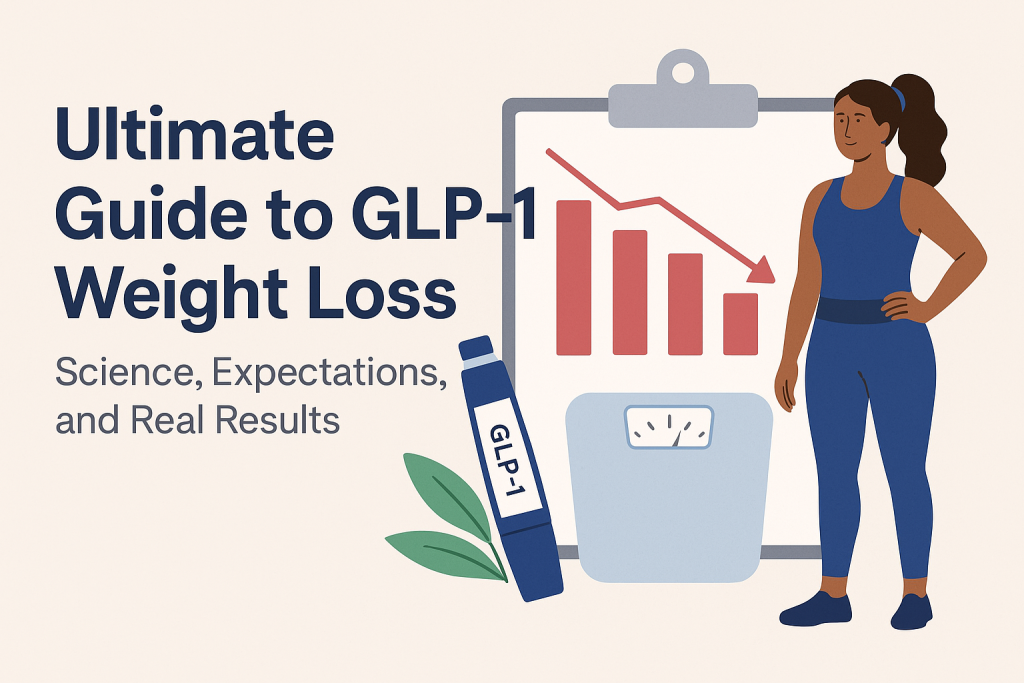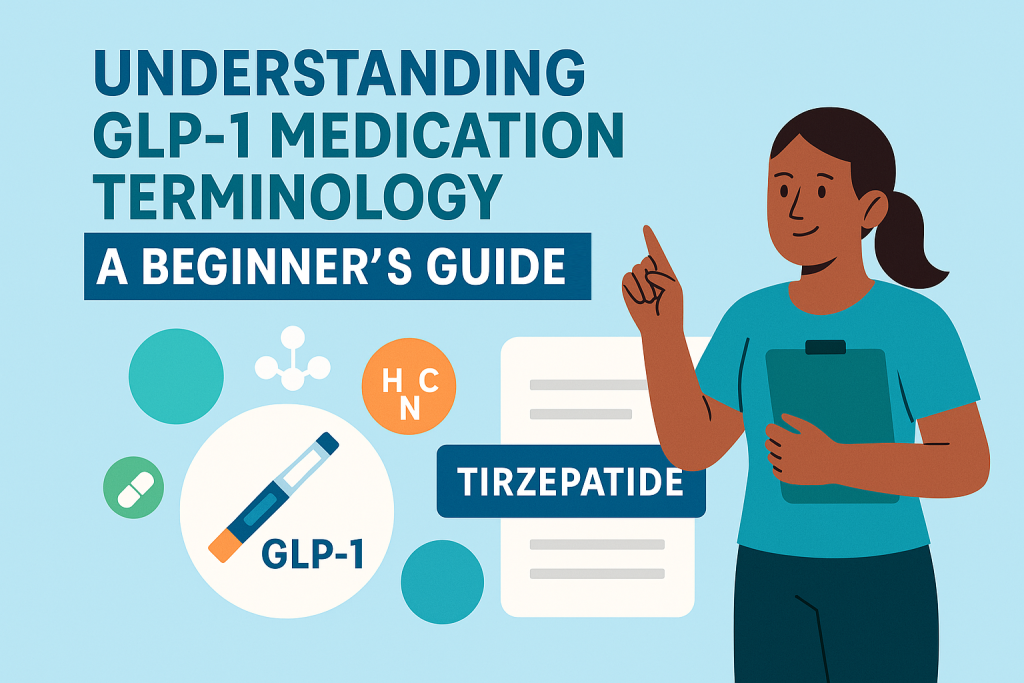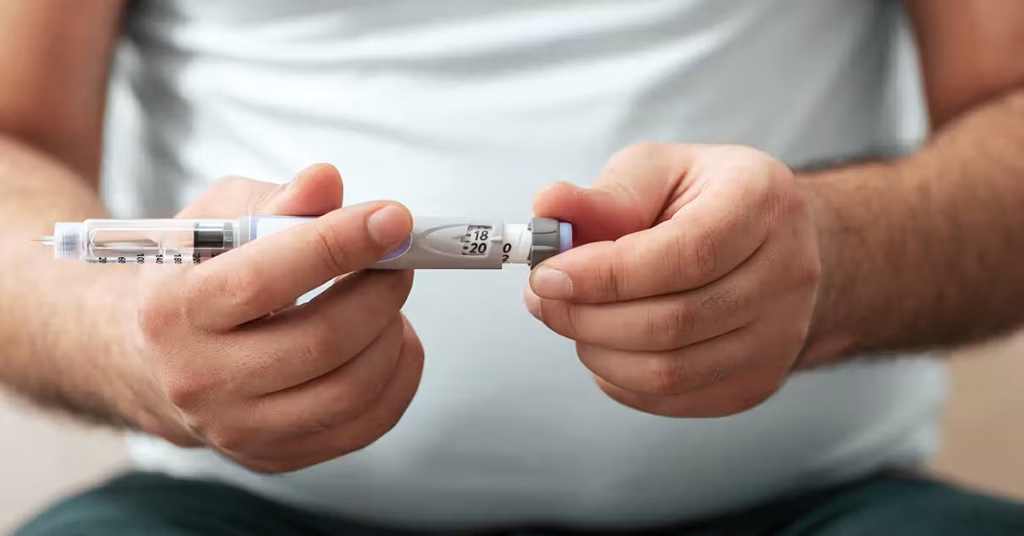- Introduction: Why GLP-1s are So Effective for Weight Loss
- How GLP-1s Affect Appetite and Metabolism
- Clinical Trial Results and Real-World Weight Loss Expectations
- How Long it Takes to See Weight Loss
- Plateauing and Adjusting Your Lifestyle
- Importance of Habit Tracking, Nutrition, Hydration
- How the Pep App Helps Users Stay on Track
- User Testimonials or Stories
- Frequently Asked Questions (Weight Loss-Specific)
- Conclusion
Introduction: Why GLP-1s are So Effective for Weight Loss
In recent years, GLP-1 medications, initially developed to treat type 2 diabetes, have surged in popularity as highly effective weight-loss solutions, gaining attention even among individuals without diabetes. Drugs like Wegovy, Ozempic, and Semaglutide have significantly transformed approaches to weight management due to their exceptional outcomes demonstrated in both clinical trials and real-world scenarios. This guide thoroughly explores the science behind GLP-1 medications, outlining precisely how they contribute to substantial weight loss, providing realistic expectations for users, detailing typical timelines for observable results, and sharing practical strategies and tracking techniques to optimize outcomes.
Many traditional methods of weight loss, such as strict dieting and intensive exercise regimens, often pose challenges due to issues with adherence and sustainability. While these traditional strategies are vital, many individuals struggle with achieving significant and lasting weight reductions. GLP-1 medications have become a breakthrough solution, directly influencing the body’s biological processes related to appetite regulation, metabolism, and energy balance. This targeted approach has transformed the weight loss journey for many, offering a powerful alternative to those who previously found weight management elusive or overwhelming.
The increasing use of GLP-1 medications has not only reshaped clinical obesity treatment but also created a wave of optimism among healthcare professionals and patients alike. This guide aims to provide clarity, insight, and practical advice to empower you throughout your weight loss journey with GLP-1 treatments.
How GLP-1s Affect Appetite and Metabolism
GLP-1 medications, technically known as glucagon-like peptide-1 receptor agonists, work by replicating the effects of the natural hormone GLP-1 produced within the intestinal tract. The substantial weight-loss benefits attributed to these medications result from their targeted actions on appetite control and metabolic processes:
- Appetite Suppression: GLP-1 medications notably diminish feelings of hunger by stimulating GLP-1 receptors located in the brain, specifically in regions responsible for hunger management and satiety. This precise action results in significantly reduced cravings, smaller meal portions, and an overall decrease in calorie consumption, contributing directly to weight loss.
- Slowed Gastric Emptying: Another critical mechanism of GLP-1 drugs involves the slowing of gastric emptying, meaning food remains in the stomach longer. This delay increases feelings of fullness and satisfaction after meals, naturally limiting calorie intake without causing feelings of deprivation or extreme hunger.
- Metabolic Improvements: GLP-1 medications positively influence metabolic health by enhancing insulin sensitivity and reducing glucagon secretion. Improved insulin sensitivity allows the body to utilize glucose more effectively, while reduced glucagon secretion lowers the rate of glucose production by the liver. Together, these adjustments lead to improved blood sugar management and reduced fat storage, providing dual benefits for diabetes control and sustained weight management.
Additionally, emerging research suggests these metabolic improvements extend further, possibly offering cardiovascular and anti-inflammatory benefits, enhancing overall health outcomes for users.
Understanding these multi-faceted physiological effects can empower users with valuable insights into why GLP-1 medications provide such profound and lasting weight loss, setting the foundation for informed usage and realistic expectations.
Clinical Trial Results and Real-World Weight Loss Expectations
Extensive clinical trials and studies have provided strong evidence of the effectiveness of GLP-1 medications, offering clarity regarding realistic expectations for potential users. The data from these studies clearly outline the substantial weight loss achievable with these medications:
- Wegovy (Semaglutide) Clinical Trials: Clinical trials involving Wegovy demonstrated remarkable weight loss, with participants losing an average of approximately 15% of their body weight over a period of 68 weeks. This impressive result significantly surpassed those achieved by participants receiving placebo treatments, highlighting Wegovy’s powerful weight-loss capabilities.
- Ozempic Clinical Trials: Similarly, trials involving Ozempic reported notable weight reductions, with participants experiencing an average weight loss of around 12% within one year. This consistent finding underscores Ozempic’s reliable and effective role in long-term weight management strategies.
Real-world experiences of patients using GLP-1 medications frequently mirror these clinical outcomes, providing practical confirmation of the medications’ effectiveness. However, individual results can vary considerably based on numerous factors such as treatment adherence, dietary choices, levels of physical activity, and personal metabolic responses. Many users report noticeable weight loss within the initial weeks and substantial ongoing results as they continue treatment. Typically, significant weight loss occurs progressively over the first three to six months, after which results gradually stabilize, allowing users to transition into effective maintenance phases.
Understanding these timelines and outcomes helps users set realistic and achievable weight-loss goals, preparing them psychologically and practically for their journey. Importantly, recognizing the essential role of lifestyle adjustments, alongside consistent use of GLP-1 medications, significantly enhances the probability of achieving and maintaining desired results.
Beyond the numbers, the emotional and psychological impacts of experiencing successful weight loss can also be profound, often improving users’ confidence, motivation, and overall quality of life. By setting accurate expectations based on empirical evidence and real-world data, users can embark on their weight loss journeys with optimism and clarity, greatly enhancing their likelihood of long-term success.
How Long it Takes to See Weight Loss
Understanding the timeline for weight loss with GLP-1 medications helps set realistic expectations and enhances motivation throughout your weight-loss journey. The following timeline outlines typical results observed in both clinical trials and real-world settings:
- First Month: Users often experience rapid initial weight loss due to significant appetite suppression and reduced calorie intake. It’s common for individuals to lose between 3% and 5% of their body weight during this early phase, although individual results vary based on adherence and initial body weight.
- 3 Months: By three months, substantial weight reduction typically becomes evident. Clinical data shows many users achieve approximately 5% to 10% total body weight loss by this point, depending on their starting weight and consistency with treatment.
- 6 Months: Weight loss generally continues steadily over the first six months. Clinical trials frequently report users reaching around 10% to 12% weight loss. Continued adherence to medication regimens and lifestyle improvements is crucial during this period.
- 1 Year: After a year of consistent use, users often stabilize at weight loss levels between 12% to 15% of their initial weight, aligning closely with clinical study outcomes observed with medications like Wegovy and Ozempic.
Factors that influence the speed and magnitude of weight loss
- Starting Weight: Individuals with higher starting body weights typically see more rapid initial weight loss due to larger caloric deficits when appetite suppression occurs.
- Adherence: Consistent medication usage significantly impacts weight-loss outcomes. Regular dosing ensures sustained appetite suppression and metabolic benefits.
- Dietary Habits: Adhering to recommended dietary guidelines, including portion control and choosing nutrient-dense foods, greatly enhances medication effectiveness.
- Physical Activity: Incorporating regular exercise accelerates weight loss and promotes better long-term weight management.
For detailed insights into weight-loss timelines, review this comprehensive research from the New England Journal of Medicine.
Plateauing and Adjusting Your Lifestyle
Experiencing weight-loss plateaus is common, even with highly effective treatments like GLP-1 medications. Plateaus typically occur when the body adapts metabolically to lower calorie intake and weight loss, reducing the rate at which additional weight is lost.
Several actionable strategies can effectively overcome these plateaus:
- Diet Adjustments: Slightly altering your dietary approach can help restart weight loss. Try adjusting your caloric intake, increasing protein and fiber, or implementing intermittent fasting techniques to break through plateaus.
- Increased Physical Activity: Enhancing or varying exercise routines can overcome metabolic adaptation. Introducing resistance training, high-intensity interval training (HIIT), or simply increasing daily activity can effectively restart progress.
- Medication Consultation: Consulting your healthcare provider about potential dosage adjustments or alternative GLP-1 medications can help optimize your treatment and overcome stagnation.
To better understand metabolic adaptations and plateauing, consult resources from reputable organizations such as the Mayo Clinic.
Importance of Habit Tracking, Nutrition, Hydration
Consistent habit tracking significantly enhances the effectiveness of GLP-1 weight loss treatments. Regular monitoring allows you to recognize patterns, make informed adjustments, and maintain accountability, crucial for sustained weight-loss success.
Habit Tracking
- Accountability and Motivation: Regular tracking boosts motivation, provides clear visibility of progress, and reinforces adherence to lifestyle changes.
- Enhanced Decision-Making: Identifying patterns in dietary habits, physical activity, and medication adherence enables proactive, informed adjustments that improve outcomes.
Nutrition
Following key nutritional guidelines significantly amplifies GLP-1 medication effectiveness:
- High Protein Intake: Consuming adequate protein promotes muscle retention, increases satiety, and boosts metabolism.
- Fiber-Rich Foods: A fiber-rich diet enhances feelings of fullness, stabilizes blood sugar levels, and supports digestive health.
- Reduced Processed Foods: Limiting processed and high-calorie foods minimizes inflammatory responses and improves metabolic function, enhancing medication efficacy.
Hydration
Proper hydration is essential for maximizing GLP-1 medication effectiveness:
- Supports Metabolic Functions: Adequate water intake supports metabolism, enhances energy levels, and facilitates fat loss.
- Reduces Side Effects: Maintaining hydration can alleviate common GLP-1 medication side effects, including nausea, headaches, and fatigue.
- Improves Satiety: Drinking sufficient water contributes to a sense of fullness, naturally reducing overall calorie consumption.
Adopting these nutritional guidelines and consistently tracking your habits can profoundly enhance your results. For additional evidence-based nutritional guidance, refer to resources provided by the Academy of Nutrition and Dietetics.
How the Pep App Helps Users Stay on Track
Effective weight loss with GLP-1 medications depends heavily on consistent tracking and adherence to treatment plans. The Pep app is specifically designed to support users throughout their weight-loss journey by offering comprehensive, user-friendly tracking tools:
- Progress Photos: Regular visual progress tracking helps users observe subtle changes and stay motivated over time, reinforcing their commitment and enhancing motivation.
- Weight Logging: Pep simplifies daily weight logging, allowing users to easily monitor and review their progress. Clear visuals and data-driven insights help users understand their progress and make informed adjustments.
- Nutrition Tracking: Pep includes detailed nutrition logs, allowing users to track daily food intake, calories, protein, fiber, and carbohydrate consumption, aligning with dietary guidelines crucial for GLP-1 medication effectiveness.
- Medication Adherence Reminders: Timely medication reminders ensure consistent dosing, optimizing therapeutic outcomes and minimizing missed doses that could hinder progress.
- Hydration Logs: Regularly tracking hydration helps users maintain adequate fluid intake, supporting overall metabolic function and mitigating common side effects such as headaches and fatigue.
By integrating these features, Pep directly supports the unique needs of GLP-1 medication users, empowering them to maximize their weight-loss potential through enhanced adherence and consistent lifestyle management. Check out all the features here or download the app for free here.
User Testimonials or Stories
- Jessica’s Journey: “After struggling for years to lose weight through traditional methods, I started using Wegovy along with the Pep app. Within six months, I lost 35 pounds! Tracking my meals, hydration, and medication made all the difference, keeping me accountable and motivated. I finally feel confident in my health journey.”
- Mark’s Success: “Using Ozempic and the Pep app completely transformed my life. Over the past year, I’ve lost nearly 50 pounds and maintained my weight. The app’s nutrition and hydration tracking made it easy to stay disciplined, and the reminders helped me never miss a dose. I highly recommend Pep to anyone serious about their GLP-1 weight loss journey.”
- Lisa’s Transformation: “The progress photo feature in Pep was incredibly motivating. Seeing the physical changes month-to-month kept me encouraged even when the scale slowed down. Thanks to Semaglutide and Pep, I’ve lost 40 pounds and regained my self-esteem and energy.”
Frequently Asked Questions (Weight Loss-Specific)
How much weight can I realistically lose on Wegovy or Ozempic?
Most users lose between 12% and 15% of their starting weight within a year, though individual results vary based on lifestyle factors and medication adherence.
Are GLP-1 medications safe for long-term weight loss?
GLP-1 medications are generally considered safe for long-term use, with studies indicating favorable safety profiles. Regular medical supervision and adherence to recommended guidelines help ensure continued safety.
Do you regain weight if you stop taking GLP-1 medications?
There is a risk of weight regain after stopping GLP-1 medications, particularly if previous dietary habits resume. Maintaining healthy lifestyle habits and continuing to track nutrition and activity levels can help mitigate this risk.
Can I speed up weight loss on GLP-1 medication?
Accelerating weight loss safely involves consistently following dietary guidelines, maintaining regular physical activity, and using tools like Pep to ensure adherence and accountability. It’s important to consult healthcare providers before making substantial lifestyle changes.
Will GLP-1 medications work without dietary changes?
While GLP-1 medications facilitate weight loss through appetite suppression and metabolic improvements, significant results are more likely when combined with dietary adjustments and a healthy lifestyle.
Conclusion
GLP-1 medications offer a powerful, scientifically-backed solution for substantial weight loss, particularly when combined with diligent tracking and lifestyle adjustments. Understanding realistic timelines, managing plateaus effectively, and maintaining consistent nutrition and hydration practices are crucial for optimizing your results.
The Pep app plays an indispensable role in maximizing GLP-1 weight-loss efforts by providing comprehensive tracking tools designed specifically for GLP-1 users. Ready to achieve your weight-loss goals? Take charge today by downloading the Pep app from the App Store and experience transformative, sustainable weight loss.
Further Reading
- Why Tracking Your GLP-1 Journey Helps You Get Better Results
- Tips for New GLP-1 Users: How to Adjust and Minimize Side Effects
- How to Reduce Nausea on GLP-1 Medications
Mounjaro Tracker App: Simplify Your Diabetes and Weight Loss Journey with Pep
Effectively managing your Mounjaro treatment requires consistency, accurate tracking of your medication, and monitoring of…
GLP-1 Pill Tracking: How to Track GLP-1 Pills
GLP-1 pill tracking is becoming increasingly important as oral GLP-1 medications enter everyday use. While…
Pep vs. Shotsy: Which GLP-1 Medication Tracking App Reigns Supreme?
In the world of GLP-1 medication management, choosing the right tracking app can make all…
Understanding GLP-1 Medication Terminology: A Beginner’s Guide
If you’re exploring GLP-1 medications, you’ve likely encountered terms like semaglutide, tirzepatide, compounds, and more….
Tips for New GLP-1 Users: How to Adjust and Minimize Side Effects
If you’re new to GLP-1 medications like Ozempic, Wegovy, Mounjaro, or Zepbound, you might be wondering how to…
Zepbound Tracker App: Simplify Your Health and Weight Management Journey with Pep
Managing your Zepbound treatment effectively requires consistency, accurate medication tracking, and comprehensive monitoring of your…





